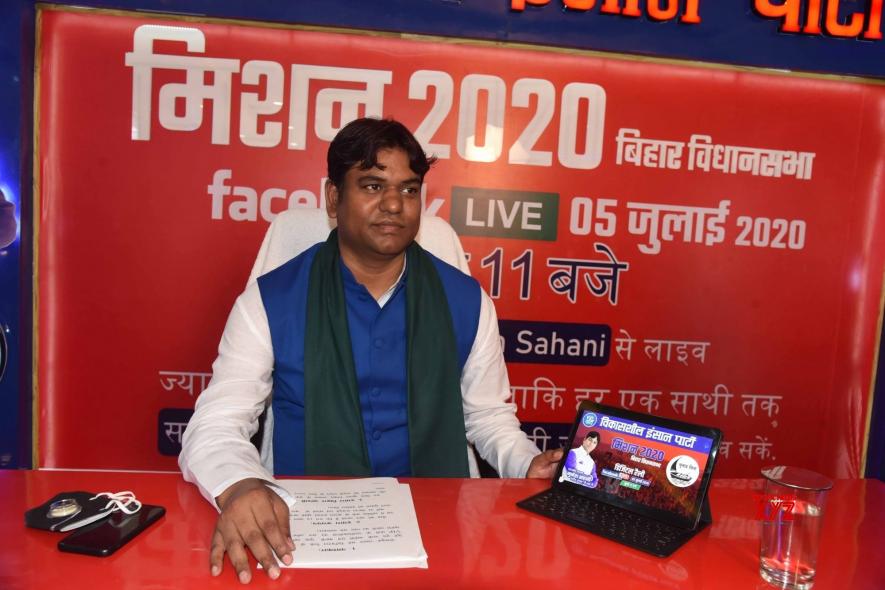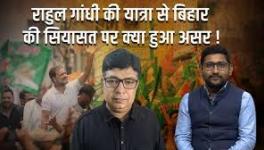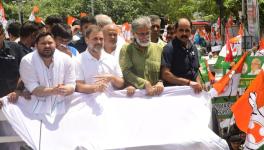Dark Horse of Bihar Polls: A Very Important Yet Ignored Party

When on 3 October, Rashtriya Janata Dal (RJD) leader Tejashwi Yadav addressed a press conference to announce the seat-sharing formula for the Mahagathbandhan (MGB) one man on the dais, visibly angry, left the podium, shouting, “Dhoka hua hai hamarey saath—We have been betrayed”. Two days later, Mukesh Sahni and his party, Vikassheel Insaan Party or VIP, joined the BJP-led National Democratic Alliance (NDA). Sahni quit the RJD-led MGB as he found the number of seats offered unsatisfactory.
At the time of Sahni’s exit, Tejashwi did not seem to break a sweat. The MGB constituents perhaps believed they had stitched together a winning combination, with the Congress party and Left parties to assist the RJD. The crowds that thronged his rallies must surely have been a massive confidence booster for Tejashwi. The charged political atmosphere gave many the feeling he was riding a wave whose crest was the chief minister’s office.
Rahat Indori famously said in a poem that one does not need a boatman’s help get across a swelling river—one must leap into the waves to swim to safety. [“Tufaano se aankh milao/ Sailabon par waar karo/ Mallahon ka chakkar chodo/ Tair ke daryaa paar karo.”]
In retrospect, we can say that what sounds nice in Indori’s poetry has definitely backfired for Tejashwi politically.
The “Son of Mallah”, Mukesh Sahni
The VIP is a recent political phenomenon in Bihar. Sahni’s journey began from behind the scenes in the Bollywood film industry. He returned to Bihar in 2018 to start a political outfit that would represent the interests of Bihar’s Mallah community of boatmen and fishermen. The Mallah community is considered an Extremely Backward Caste (EBC) within the larger Other Backward Classes (OBC) framework.
The emergence of the VIP is in consonance with the post-Mandal trend in Bihar politics. In its hey-day, the “Mandalisation of politics” helped politically mobilise the marginalised communities along broad categories such as OBC or Scheduled Caste (SC) in the Hindi heartland. However, over the last two decades, the OBCs and SCs have politically fragmented. The emergence of caste and sub-caste specific parties such as VIP and the Hindustan Awam Morcha or HAM of Jitan Ram Manjhi, which claims to represent the Musahar caste amongst the SCs, are a case in point.
Two processes have been unfolding simultaneously in post-Mandal Bihar. First among these is the rising political dominance of certain castes within the larger OBC or SC categories, for example, the Yadavs within OBCs or the Paswans amongst SCs. This has led to fissiparous tendencies amongst marginalised social groups. Secondly, Bihar Chief Minister Nitish Kumar’s to build a vote bank of the “most-backward amongst the backward groups”, by promoting sub-categorisation of the OBC and SC quotas. This has given rise to newer and narrower social identities such as EBC and Mahadalit. These dual processes have led to weakening of social solidarity amongst dispossessed sections of society.
Why Mallah Votes Matter
Political parties that represent specific communities have restricted areas of influence. For example, Asaduddin Owaisi’s AIMIM has sprung a surprise by winning five seats in this election. Owaisi’s political appeal is restricted to the Seemanchal region, which includes Araria, Purnea, Kishanganj and Katihar districts, where the Muslims have the largest demographic presence. Thus the Owaisi factor does not work beyond 20-25 constituencies of the Bihar legislature.
The Mallah vote, by contrast, is not concentrated in any particular region of Bihar. They are spread across the entire state and therefore their votes can change the political fortunes in almost half the seats of Bihar Assembly. Normally, it is the agrarian or land-owning communities which have a statewide presence. This explains why the Yadav community are present in every constituency of Bihar in substantial numbers. But the Mallah are not an agricultural caste. The peculiar social geography of Bihar is what guarantees their ubiquitous presence.
The livelihood of people belonging to the Mallah caste is closely tied to Bihar’s riverine economy. The occupational hierarchy that India’s caste society engenders has restricted Mallahs to occupations such as fishing, ferrying boats and so on. As hundreds of rivers and their distributaries criss-cross Bihar, one is almost guaranteed to spot Mallah households on the riverbank. In the last few decades, the forces of modern development have taken a toll on the community.
Its members are at the bottom of Bihar socio-economic indices, they cannot afford mechanised fishing trawlers, which threaten to displace traditional fishermen like them. Similarly, the infrastructure development that is taking place in Bihar—such as the many bridges being built over its gushing rivers—has made the ferries manned by Mallahs, which helped people cross turbulent waters, redundant.
Herein lies a uniquely Indian conundrum. Social mobility is restricted by caste barriers, which traps people in occupations allocated by the traditional caste system. When development processes displace certain occupational groups, given the strong association between caste and occupation, the displaced often turn to specific caste-based parties, through which they hope for redress for their occupational grievances. On the other hand, caste specific parties, due to their limited appeal among other castes and communities, never gain enough political strength to win any political office which can help them address the grievances of their voters.
BJP’s EBC Outreach
The Mallah are also known as Nishad. In Uttar Pradesh, the BJP had tied up with the Nishad Party, which is a mirror image of the VIP in Bihar. In addition, Nitish Kumar has managed to puncture RJD leader and former chief minister Lalu Yadav’s OBC vote bank by creating a distinct EBC category, whose members comprise the “most backward among the backward” sections of society.
Further, in October 2017, the Centre constituted a commission led by the former Delhi High Court judge, Justice Rohini, to give recommendations on sub-categorising the existing OBC quota. With this commission, the Modi-led government is trying to replicate the Nitish model on a national scale, but with a distinct ideological agenda. For years, BJP’s Ram Mandir agenda countered Mandal politics in the Hindi heartland. The OBC-EBC divide will help the BJP further erode the mass base of Mandal mobilisations. But the BJP does not view its Nishad outreach as a project to get the right political arithmetic to simply win elections.
Social scientists such as Badri Narayan have documented how the kar sewaks tried to mobilise the Nishad-Mallah communities in 1992 for the Ram temple movement. They used the memory of Nishad Raja, a character from the Ramayana, who, according to the epic, helped Ram cross a river during his exile. Schemes such as Namami Gange specifically target communities that depend on the river Ganga and its tributaries.
It is pertinent to remember an account from the other major Hindu epic, the Mahabharata. In it, Arjuna was said to be Dronacharya’s best archery disciple. Yet, Dronacharya discovered a better archer than Arjuna—Eklavya, who confessed he had picked up the skill only by secretly observing Dronacharya train Arjuna and his brothers. Dronacharya then demanded Eklavya’s right thumb as guru dakshina, or tuition fees, effectively ending Eklavya’s archery. Thus Dronacharya ensured military skills would remain confined to the Kshatriya Pandavas. Eklavya, a Nishad belonging to the Shudra Varna, would not be able to challenge Arjuna. As a result, the “Dharma” of caste society was protected and upheld.
Tejashwi’s Folly
The RJD scion tried hard to shed the image of “Jungle-Raj” that had become synonymous with his party. He attempted to repackage the party as one concerned with not only social justice but economic justice as well. In the recently-concluded Assembly election, the mishandling of the Covid-19 pandemic and arbitrary lockdown had become major issues. The lockdown inspired by the pandemic still disrupts people’s livelihoods, and has created a flood of unemployment much bigger than any natural disaster. The promise of 10 lakh government jobs was part of his new political messaging to Bihar’s swelling ranks of the unemployed.
Despite the universal appeal of his economic message, it seems the non-Yadav OBCs remained unconvinced of Tejashwi’s assurance that the Yadav domination would be kept in check, should the MGB come to power. As it was the EBCs and Dalits who had to bear the brunt of Yadav domination, the presence of non-Yadav OBC leaders such as Sahni might have enhanced the credibility of Tejashwi’s message,
Caste-specific parties such as the VIP are unable to win Assembly seats on their own. Yet, when in alliances with other formations, they can taste political success. The VIP managed to win four of the 11 seats it contested in alliance with BJP.
Moreover, such parties bring big political dividends for major parties they tie up with. If the VIP successfully transfers even 2,000 or 3,000 votes in a constituency, it can change the political picture. Election Commission data shows that the margin of victory in eight constituencies was lower than 1,000 votes. The VIP has turned out to be the de-facto king-maker in Bihar.
Still, it must be mentioned that even though things are looking up now for the VIP, this may not hold true in the future. The BJP has successfully sidelined the JD-U, which is a major political force in the state. Gobbling up a small party like the VIP will not take much time or effort.
Sahni must remember, Nishad Raja is respected by the mainstream because he meekly performed his caste duty as a boatman and served the Kshatriya king without having any expectations. Eklavya, on the other hand, was punished because he displayed skill, talent and ambition, which the dominant socio-political forces perceived as a threat to the status quo.
To define its future political strategy, the VIP and Sahni must choose between a “politics of accommodation” represented by the legacy of Nishad Raja and a “politics of justice” represented by the memory of Eklavya.
The author is a professor of political science. His research interests include environmental politics. The views are personal.
Get the latest reports & analysis with people's perspective on Protests, movements & deep analytical videos, discussions of the current affairs in your Telegram app. Subscribe to NewsClick's Telegram channel & get Real-Time updates on stories, as they get published on our website.
























